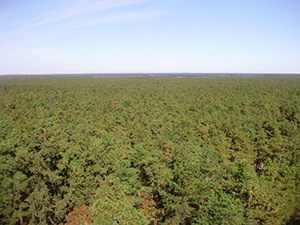
The Northeast Regional Earth System Model
Ecosystem Services
"Environmental technology which duplicates the work available from the ecological sector is an economic handicap." (Howard T. Odum, Pioneering American Ecologist, 1924-2002).
The Northeast’s diverse ecosystems: a myriad of forests, wetlands, rivers and lawns - provides many services upon which we depend. Ecosystem services range from the obvious – crops, fish, fresh water, recreation – to those that are easy to overlook such as regulating the natural cycles of nutrients or filtering pollution. Global climate change and regional policy decisions will interplay to significantly impact the region’s ecosystems and the services they provide through the 21st Century.
One of the most important components of the NE-RESM is the translation of biogeophysical model outputs into a portfolio of ecosystem services to provide actionable information for decision makers to help them protect ecosystem services. The ecosystem services we consider include:
- Carbon sequestration
- Municipal water supply
- Food
- Fuel/Electric power generation
- Fiber
- Refugia for wildlife
- Water flow regulation
- Filtration/pollution reduction
- Culture and recreation
Our economy is linked in innumerable ways to ecosystem services, but it can be very difficult to put a price tag on the services they provide. The NE-RESM's mesoeconomic model allows us to quantify how some changes in the region’s ecosystem services will impact our future economy.

New Jersey Pine Barrens

Image courtesy of Carl Zitsman, US Fish and Wildlife Service).

